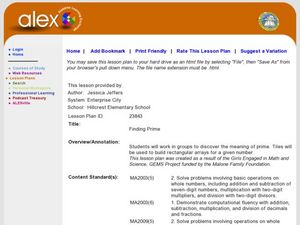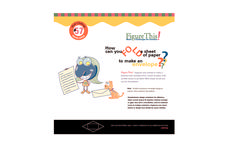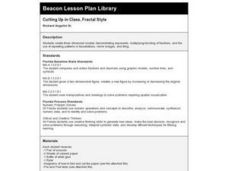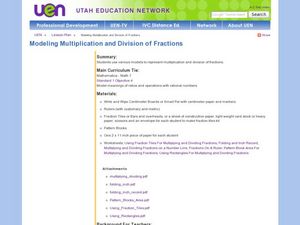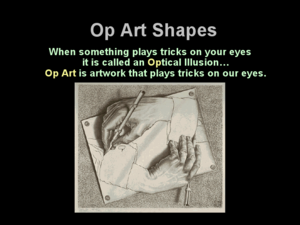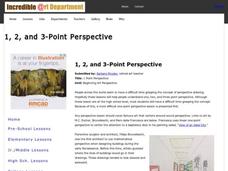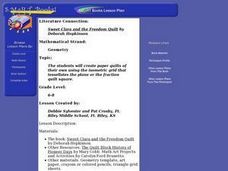Alabama Learning Exchange
Finding Prime
Fifth and sixth graders explore prime numbers. They work with a partner to build rectangular arrays using twelve tiles. Factor pairs are noted and recorded on graph paper. Pupils construct rectangular arrays with a prime number and...
Mathed Up!
2D and 3D Shapes
What a great assessment to give young mathematicians in order to test their knowledge on two- and three-dimensional shapes. Learners name various shapes, identify the number of edges, faces, and vertices, match an unfolded version of a...
Curated OER
Math Challenges
Students engage their critical thinking skills to solve challenging math problems. In these problem solving lessons, student work with tessellations, weights/measurement, reasoning, surface area, geometric shapes, and algebraic procedures.
Curated OER
Cutting Up in Class, Fractal Style
Students create three-dimension models demonstrating exponents, multiplying and dividing of fractions, and the use of repeating patterns in tessellations, mirror images, and tiling.
Curated OER
Adopt An Insect
This lesson plan combines a creative building activity with analyzing a butterfly photograph and using problem solving to complete the puzzle. It blends art and science very well. Learners will learn and enjoy the process. The extension...
Curated OER
Symmetry: Theory, Reality and Art!
Students explore the concept of geometric symmetry. In this geometric symmetry lesson, students walk around their school and take pictures of objects that demonstrate symmetry. Students use Microsoft Paint to draw the lines of symmetry...
Wake Forest University
Authentic Activities for Connecting Mathematics to the Real World
Check out the handout from a presentation that contains a collection of high school algebra projects connecting a variety of mathematics to the real world. Activities range from simple probabilities to calculus. The activities can be...
PBS
Frame Yourself: Area and Perimeter
Elementary schoolers are arranged in pairs and view the video Math Works: Measurement: The Difference Between Perimeter and Area. They discuss any prior knowledge they have of the term perimeter and then brainstorm together what the...
Curated OER
Modeling Multiplication and Division of Fractions
Create models to demonstrate multiplication and division of fractions. Using fraction tiles to model fractions, pupils explore fractions on a ruler and use pattern blocks to multiply and divide. They also create number lines with fractions.
Math Worksheets Land
Using Tiling to Find Area - Guided Lesson
By splitting a rectangle into equal parts, scholars can see area as well as calculate it. First, they determine the area of a rectangle given its side lengths. Then, they use the space provided to segment it into four equal parts,...
Curated OER
Op Art Shapes
Op art is fun to look at, and it's fun to make. Kids learn about the origins of op art and the op art master, M.C. Escher. They view simple to complex examples of op art to see how it works and then create an optical piece of their own....
Incredible Art
1, 2, and 3-Point Perspective
Introduce drawing high schoolers to perspective with a series of instructional activity that detail how to draft images in one-, two-, and three-point perspective. Each exercise includes step-by-step, illustrated directions and examples.
National Gallery of Canada
Self-Portrait, Mirrors and Metamorphosis!
Using M.C. Escher's Hand with Reflecting Sphere as inspiration, learners create their own set of self-portraits using various reflective surfaces. The lesson begins with a discussion about portraiture and ends with a presentation of work...
National Gallery of Canada
Lumps, Bumps, Gritty, and Soft!
Texture can really add to a work of art. Explore texture through observation and practice. Learners view and discuss works of art by M.C. Escher. They then create their own texture samplers with six different materials.
National Gallery of Canada
My Upside-Down World!
M.C. Escher is famous for creating optical illusions. Examine this effect in several of his works and discuss the techniques involved. Inspired by the discussion, learners create an imaginary 3-D world inside of a box using various...
Houghton Mifflin Harcourt
Unit 6 Math Vocabulary Cards (Grade 5)
Acute angles, nets, and vertices are only a few terms that a set of flash cards includes. Among the 108 cards, two types are available; word cards printed in bold-faced lettering, and corresponding definition cards equipped with an...
Texteam Geometry Institute
Geometry for the High School Classroom
What does it mean for apples to have chirality? This and other explorations in geometry, such as tiling the plane, boxing a tetrahedron, and investigating Euclid's Characteristic, are included in this resource on Euclidean geometry....
Curated OER
Visual Arts: Matisse and Escher
Third graders are introduced to the art of Henri Matisse and M.C. Escher. They create original works in the styles of Matisse and Escher and consider how their innovations have affected modern art.
Curated OER
Valentine's Day Fun
Learners choose various shapes and colors to create a Valentine's 'person'. In this Valentine's Day lesson, students design collages, make prints and mosaic pictures. More advanced learners create a Tessellation using geometric shapes.
Curated OER
Logo Licenses
Third graders find all the lines of reflection symmetry in a given shape, identify the order of rotational symmetry of a given shape. They create designs which have reflection symmetry, rotational symmetry (orders 2, 3, 4, 6) and...
Curated OER
Fold and Cut 2
Second graders make, name, and describe, using their own language and the language of geometry, everyday shapes and objects. They create and discuss geometric patterns which repeat (show translation), or which have rotational or...
Curated OER
Doorways/Printmaking
Students are introduced to the techniques used in printmaking along with the relief method and tessellation relationships to art. In groups, they examine a variety of architecture used throughout the Islamic culture. To end the lesson,...
Curated OER
"Sweet Clara and the Freedom Quilt" by Deborah Hopkinson
Students create paper quilts of their own using the isometric grid that tessellates the plane or the fraction quilt square.
Curated OER
Mandala Art
Students investigate art elements such as color schemes and proportion by creating their own personal Mandala Circle on paper or canvas. This also allows students to investigate mathematical concepts such as tesselations or social...
Other popular searches
- Visual Art Tesselations
- Math Lessons on Tesselations
- Drawing Tesselations
- Tesselations Hexagon
- Geometry Tesselations
- Making Tesselations
- Tesselations History
- Rotations, Tesselations
- Tiles and Tesselations
- Geometry + Tesselations
- Introduction to Tesselations
- Tesselations Halloween


